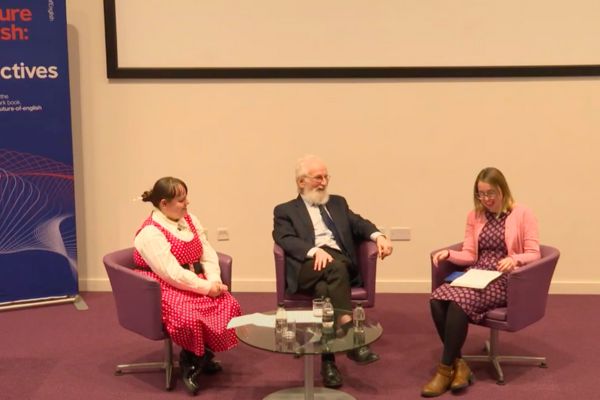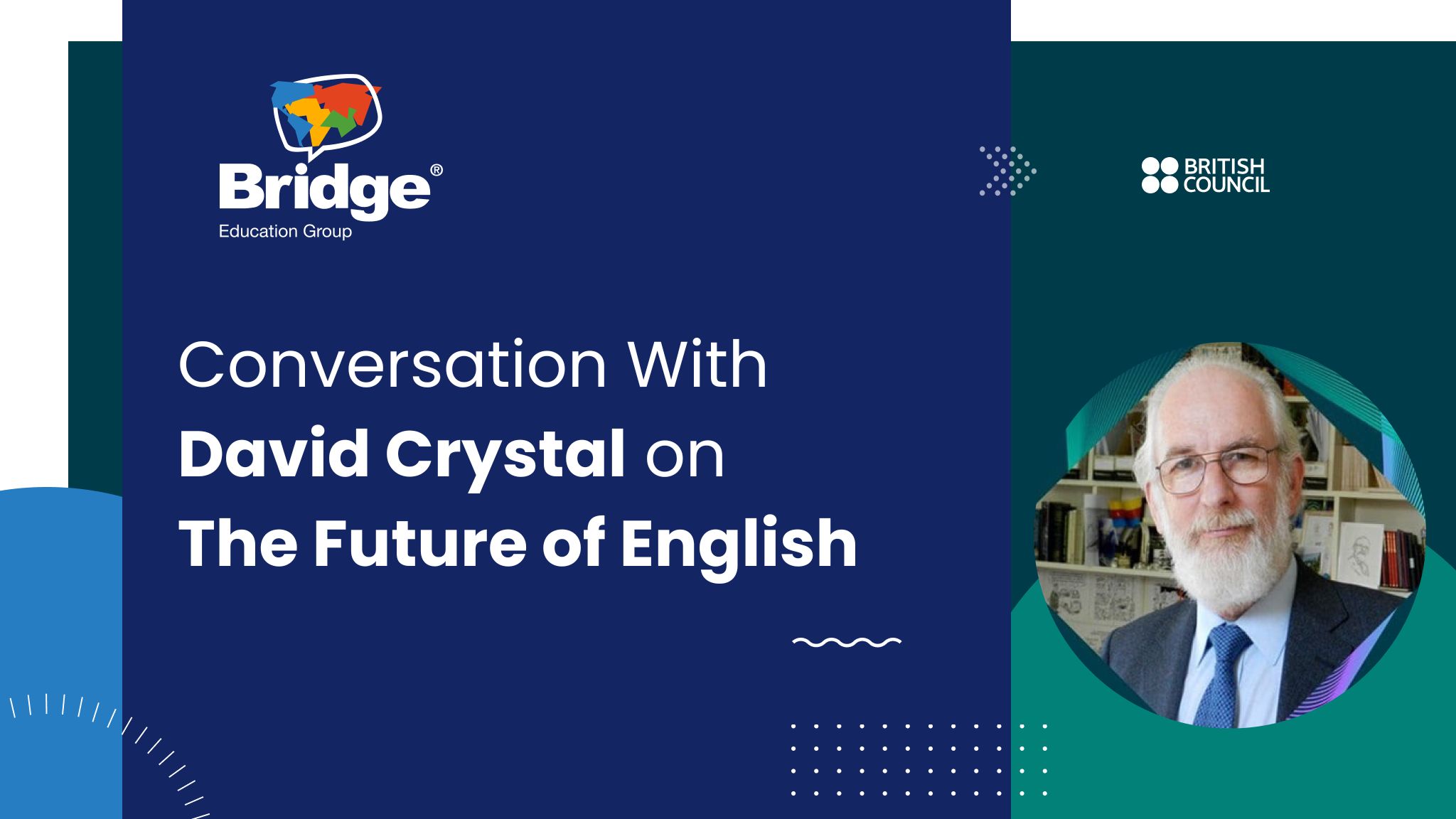What’s the future of English in our hyper-connected, tech-driven world? Renowned linguist and author David Crystal shared his thoughts on the state of English as a global language and its future during a panel for the British Council, exploring everything from AI and slang to global English dialects and teenage language trends.
Originally from Northern Ireland and currently residing in Wales, Crystal is the co-author of the Cambridge Encyclopedia of Language (1987, 1997, 2010), and the Cambridge Encyclopedia of the English Language (1995, 2003, 2019). He is also the author of several other books about language.
Bridge attended the discussion. The conversation showcased shared goals of the British Council and Bridge, as they promote English teaching and learning. This article recaps the highlights of Crystal’s talk. You can watch the full replay on YouTube here.
“At the moment, none of the other dominant languages in the world are showing anything like the speed of globalization that we’re seeing in the course of English.”
– David Crystal
English as a Global Language
To begin, Crystal emphasized that English has become a global lingua franca, used by speakers from diverse linguistic backgrounds.
“At the moment, none of the other dominant languages in the world are showing anything like the speed of globalization that we’re seeing in the course of English,” he explained.
This spread influences the language, leading to the emergence of new varieties and dialects. English in South Africa will therefore be different from English in Nigeria. This difference is inevitable, and English will keep evolving throughout the globe just as it has over the centuries. New words, pronunciations, and grammar rules will emerge.
However, at the moment, English does not run the risk of becoming a dead language, like Latin. While this could change, it would take thousands of years.

The Power of English
Just how did English become such a dominant language? According to Crystal, it comes down to the power of the people who speak it.
“There is no other reason, but of course, power means different things at different times. So in the case of English, we have to reflect on political power, military power, the power of the British Empire, the American empire, and so forth,” he said.
He emphasized that virtually every cultural innovation in the 20th century began in English.
“Think of advertising and cinema. Around 80% of the films in the world are still being made in English. This is the sort of reason that will get discussed in different books about English as a global language.”
This was the norm until relatively recently, he explained, because everything changed with the spread of the Internet.
“It’s the speed of change that has been so noticeable. It makes it so difficult to study and is also a fresh problem for the English language learning community.”
– David Crystal
Technology and English
Crystal highlighted how technology, particularly the Internet and social media, affects language use. This includes changes in vocabulary, grammar, and the way people communicate (like abbreviations and slang). He suggests that these innovations may lead to a more informal and fluid approach to language.
As an example, he cites the arrival of Twitter in 2006. Users were encouraged to answer the prompt, “What are you doing?” which led to personal answers in the present tense to be shared with an audience. Today, Twitter no longer goes by said name, and the prompt has evolved to “What is happening?!” This encourages different answers.
“It’s the speed of change that has been so noticeable,” Crystal said. “It makes it so difficult to study and is also a fresh problem for the English language learning community. There is an increasing cultural gap between generations.”
Whether it’s due to technology or other reasons, Crystal often studies the potential for English to continue evolving in unpredictable ways. He suggests that while some may worry about language deterioration, such changes often reflect natural linguistic processes rather than decline.

Educational Implications
When asked about education and English language professionals, Crystal focused on the importance of teaching English in a way that embraces its global and dynamic nature, preparing learners to communicate effectively across cultures and contexts.
“One of the biggest problems facing English language teaching generally is not the learning of the pronunciation and the grammar and the basic vocabulary; it’s getting that level of awareness of the cultural identity of the language,” he said.
Today, teachers have a much more difficult job than before, mainly because everybody has access to the Internet now. This means that there’s exposure to all kinds of differences.
“Everybody is now using a computer or a cell phone or something. As a result, these variations in English and the tension that is developing are not like anything I’ve seen before. So the younger you go in studying English now, the greater this problem is going to appear.”
“You’ve got to enthuse the teenagers. Otherwise, you’re wasting your time.”
– David Crystal
Language Transmission
Crystal ended the forum by taking questions from the in-person and online audiences. One of the main messages he answered was how English, and languages in general, must be passed down.
“It’s the younger generation that is the crucial one. Whether it’s accents, dialects, or an entire language,” he said. “We’re talking about intergenerational transmission. If you don’t have that, then a language or a dialect is dead. It’s gone.”
So what’s the solution? For Crystal, it’s about appealing to the teenagers.
“You’ve got to enthuse the teenagers. Otherwise, you’re wasting your time. So how do you do that? Because they are now predominantly Internet-oriented for language learning in class or anywhere else, it’s evident that there is where the future lies,” he continued.
Learning through the Internet means knowing how to deal with AI. Today, the Internet is increasingly seeing more “robots” answer questions that were previously meant for humans. This could affect how teenagers and other students learning English could understand the language.
“The reason, of course, is that the main AI organizations are American. So you get American spelling, pronunciation, and vocabulary to some extent. You will talk about the “trunk of the car” as opposed to the “boot of the car” and things like that,” he said.
In the future, Crystal believes this could change as other countries start to develop their own artificial intelligence.
Crystal is optimistic about the future of English, viewing its evolution as a natural and positive process. He believes that rather than becoming one uniform language, English will diversify and adapt to different cultures and technologies.
His insights align with the British Council’s objectives to foster connections through language and culture, making their collaboration beneficial for both language education and cultural exchange.



